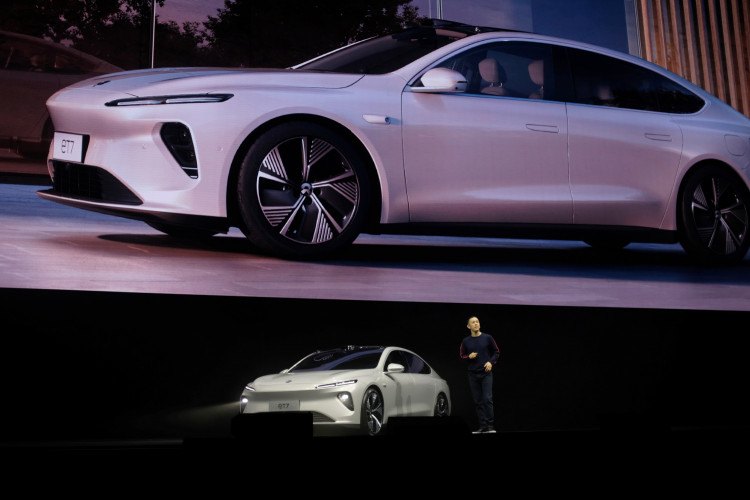The European Union (EU) has approved hefty tariffs on Chinese-made electric vehicles (EVs), pressing ahead despite internal divisions within the bloc and fierce opposition from China. The EU's executive body announced the move on Friday, following a pivotal vote among member states. The tariffs, which could reach as high as 45%, are intended to counter what the EU views as unfair subsidies provided by the Chinese government to its domestic carmakers. The measures are set to take effect next month and will remain in place for five years.
Germany, the EU's largest economy and a major car manufacturer, voted against the tariffs, exposing a rift within the bloc over how to handle its largest trade conflict with Beijing in over a decade. Despite Germany's opposition, the European Commission secured enough support from other member states, including France, Italy, and Poland, to move forward. In total, 10 countries backed the tariffs, five voted against, and 12 abstained.
"An economic cold war with China is looming," Hungarian Prime Minister Viktor Orban warned, reflecting concerns that the EU's decision could spark a broader trade conflict. Orban was one of the leaders who opposed the tariffs, alongside German car manufacturers who are deeply integrated with Chinese supply chains. BMW CEO Oliver Zipse criticized the vote as "a fatal signal for the European automotive industry" and called for a quick settlement to prevent a full-blown trade war.
The tariffs follow a year-long investigation by the European Commission, which concluded that Chinese EVs are being sold in Europe at unfairly low prices due to government subsidies. "The necessary support for these measures has been secured," the Commission said in a statement, but added that it remains open to continued talks with Beijing to find a negotiated solution. One possible compromise could involve setting minimum sales prices for Chinese EVs entering the EU market.
China has strongly condemned the tariffs, describing them as "unfair" and in violation of World Trade Organization (WTO) rules. Beijing has already launched a formal WTO challenge against the EU and hinted at possible retaliatory measures. This could include targeting key European exports like dairy, pork products, and luxury goods. "The risk is that Beijing feels a need to respond to the duties with retaliatory measures of its own, which torpedo the chances of a negotiated solution," said Noah Barkin, senior advisor at Rhodium Group.
The vote highlighted the deep divisions within the EU on how to manage its economic relationship with China. While some member states, like France, support a tougher stance against Chinese subsidies, others are wary of the potential fallout from a tit-for-tat trade war. China has become the dominant player in several key industries, including solar panels and electric vehicles. European policymakers fear a repeat of their failure to impose effective tariffs on Chinese solar panels a decade ago, which led to China capturing over 90% of the EU market in photovoltaic products.
The European Commission has argued that without intervention, Europe risks being flooded with Chinese EVs, undercutting its own manufacturers. China's production capacity of three million EVs per year, double the size of the EU market, has made Europe a key target for exports, especially since the U.S. and Canada have imposed 100% tariffs on Chinese cars. "The sector is under pressure from carbon reduction plans and the Chinese global commercial offensive," said Stellantis, a major European carmaker, in support of the tariffs.
The EU tariffs will apply different rates depending on the company. Tesla faces a tariff of 7.8%, while companies like SAIC and others that did not cooperate with the EU's investigation could face duties as high as 35.3%. These tariffs are in addition to the EU's standard 10% import duty on cars.
Some experts are skeptical about whether the tariffs will have the desired effect. Laurent Ruessmann, a partner at RB Legal who represented EU industry in the solar panel case, warned that it might not be enough to save the European car industry from Chinese competition. "It was so difficult even to get these measures. It's better than the solar panel case, but is it enough to save an industry? I would be surprised," he said.
The decision to move forward with the tariffs comes at a time when the EU's relationship with China is increasingly fraught. The European Commission views China as both a partner and a competitor, and its stance towards Beijing has hardened over the past five years. As part of ongoing negotiations with China, the Commission may re-examine the idea of setting a minimum import price to avoid imposing tariffs altogether. One case being discussed is that of Volvo Cars, owned by China's Geely Holding, which hopes to avoid tariffs by agreeing to price undertakings.
With China expected to retaliate, tensions between the EU and Beijing are likely to escalate further, raising concerns about the long-term impact on the global economy and the European car industry.





